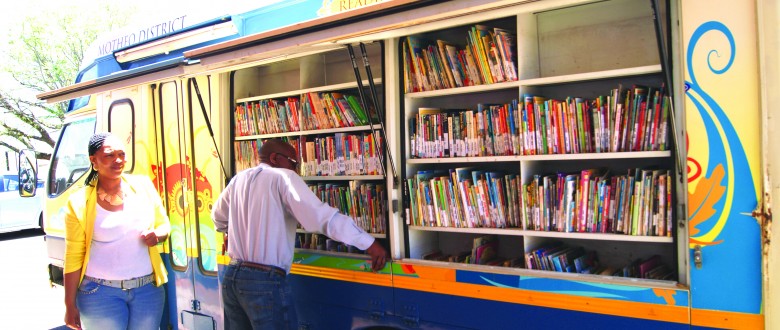
Ten mobile libraries journey from school to school in Free State, South Africa, to expose children in rural areas to books. An impact study of this strategy to tackle low literacy levels presented the ideal opportunity to also strengthen the research capacity of officials from the province’s District Teacher Development Centres.
Driving literacy
Today marks the 50th anniversary of International Literacy Day. Literacy rates worldwide are rising, but South Africa still faces a challenge. The Progress in International Reading Literacy Study of 2011 for example classified 29% of nine-year-old students as illiterate, because they could not “locate and retrieve an explicitly stated detail”. This failure to embed the fundamental principles of literacy in primary education is at the heart of high drop-out rates in higher education institutions.
The South Africa Primary Education Support Initiative is committed to putting books in the hands of children across the country by donating mobile libraries (MoLis). In the Free State province specifically, which is considered ‘rural’, 1087 primary schools do not have a school library. Instead, ten MoLis with 2000 books each are travelling from school to school to involve as many children as possible in reading. The MoLis visit under-resourced schools at least twice every school term, not only to loan and collect books, but also to advise teachers on which books to select and how to use them in class.
Strengthening research skills
The MoLi-strategy to improve literacy levels is supported by the Free State Department of Education and implemented by staff from the District Teacher Development Centres (DTDC). The project kicked off in 2007, yet until 2014 no formal research was carried out on its effects. VVOB saw in the Department’s request to undertake an impact study a much-needed opportunity to also address the lack of strong research skills within the DTDC. Through organising a study that involved 13 officials from the DTDC, VVOB aimed to build their capacity as researchers through strengthening their monitoring and evaluation skills.
VVOB engaged the University of the Free State in an action research trajectory, which is a research approach that integrates personal reflection and self-evaluation to motivate actions for change. The question the partners set out to answer was: “What is the value of the Mobile Libraries and how can the service offered by the Mobile Libraries be improved?”. The action research addressed practical questions about research in general, such as ethical considerations, how to interview human subjects and interpreting qualitative data. These insights were simultaneously linked and applied to the research at hand.
Spreading out
Engaging in this research cycle through hands-on work experience made DTDC officials realise that a reflective attitude towards their work can help them identify gaps in their interventions, improve their service to schools and yield better results. Olga Lekitlane, Media Subject Advisor of the DTDC in Lejweleputswa (left in small picture above) has learned to question her actions: “We should start with an open mind if we start a new activity. Where do we want to see ourselves when completing the activity? What do we want to achieve? If there is a training for teachers, what impact will it have? Currently, we do not look at such things. Because of the action research, we will know what we want to achieve and to reflect on what we had planned.”
Having heard of the effects of the action research, the Department of Education of the province of Gauteng has reached out to conduct a similar impact study of their mobile libraries.
The official findings of the impact study of mobile libraries in Free State province were presented on 22 September in Bloemfontein. The research shows a clear improvement in English reading and speaking capabilities among the children whose primary schools have been regularly serviced by mobile libraries. "The children were able to converse comfortably with us in English and also read from their library books with ease and comprehension", said Dr. Lynette Jacobs, head of the School of Education Studies. "We also found that teachers were able to use the library books productively as part of their class management."
Impact of capacity building through action research





